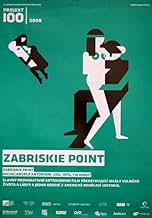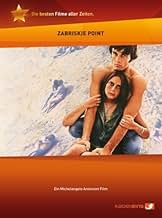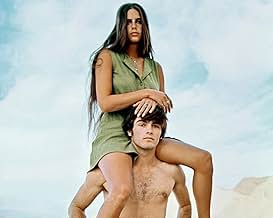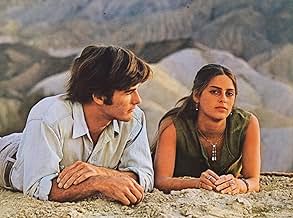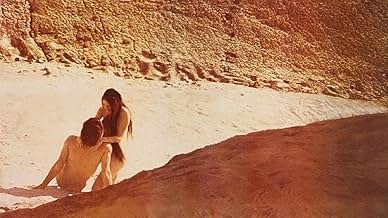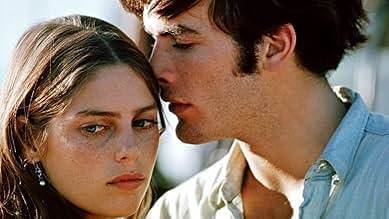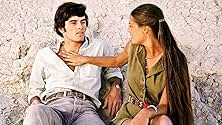At a time of chronic civil unrest in late 1960s America, a young revolutionary suspected of murder steals a plane and meets a girl.At a time of chronic civil unrest in late 1960s America, a young revolutionary suspected of murder steals a plane and meets a girl.At a time of chronic civil unrest in late 1960s America, a young revolutionary suspected of murder steals a plane and meets a girl.
- Awards
- 1 win & 1 nomination total
Martin Abrahams
- Radical student
- (uncredited)
Michael L. Davis
- Police lieutenant on loudspeaker
- (uncredited)
Lee Duncan
- Highway patrolman
- (uncredited)
George Dunn
- Airport mechanic
- (uncredited)
Dennis Falt
- University student
- (uncredited)
Harrison Ford
- Arrested student
- (uncredited)
Jim Goldrup
- College student
- (uncredited)
Norman Grabowski
- Man in Deli
- (uncredited)
Bill Hickman
- Gun store owner
- (uncredited)
- …
Kenner G. Kemp
- Departing Plane Passenger
- (uncredited)
Peter Lake
- Documentary cameraman
- (uncredited)
Storyline
Did you know
- TriviaAntonioni met with Jim Morrison during early production to ask for a musical contribution to the soundtrack. Morrison and the Doors provided "L'America" which Antonioni then rejected.
- GoofsZabriskie Point, in Death Valley National Park (California, USA) is not actually the lowest-elevation point in the United States. That would be Badwater Basin, at a depth of 282 feet below sea level, which is also located in Death Valley National Park about 20 miles away.
- Quotes
[booking a protester]
Cop: Occupation?
William S. Polit, protester: Associate professor of history.
Cop: That's too long, Bill. I'll just put down clerk.
- Alternate versionsIn the original version, the song that's playing when Daria drives away at the very end and over the closing "End" title card is a Roy Orbison song, but in the 1984 MGM/UA Home Video version it's a continuation of the Pink Floyd song. The 1991 MGM/UA Home Video version restores the Orbison song.
- ConnectionsEdited into Histoire(s) du cinéma: La monnaie de l'absolu (1999)
Featured review
There aren't too many times when I see a film and go, "huh, what?", but this was one of them. Maybe after seeing Zabriskie Point I felt much the same way Woody Allen felt after seeing 2001- he only liked the film after seeing it three times over a two year period, realizing the filmmaker was ahead of him in what was going on. Michelangelo Antonioni, in one of his few tries at making films inside of the US (after Red Desert, he did Blow-Up, this film, China, and The Passenger, all filmed outside his native Italy), I could sense he almost tried to learn about the ways of the country through his own mastery of the medium. The results show that he doesn't lack the means to present images, feelings, tones, colors, sounds, and a visual representation of this era. "A director's job is to see", Antonioni once stated. Whatever that means, he doesn't disappoint for the admirer of his post-fifties work (I say post-fifties since I've yet to see any of his films from before L'Avventura).
What he does lack is a point, at least the kind of point that he could bring in Blow-Up and The Eclipse. You get the feeling of what is around these characters, what the themes are bringing forth to their consciousness, however in this case the characters and the actors don't bring much conviction or purpose. Antonioni, coming from the school of hard-knocks, neo-realistic film-making, does do what he can with his mostly non-professional cast (those who look most like real actors are subjugated to the roles of the corporate characters), but the two stars Mark Frechette and Daria Halprin seem as if Antonioni's under-directing them. Perhaps that was the point. The story's split into three acts, thankfully not too confusing, as Mark escapes his existence around the boiling, dangerous campus life going on in the circa late 60's LA area, and Daria is sent out from LA to drive to Phoenix for some business meeting. They meet by chance as Mark's plane (how does he know how to drive, maybe a little background info there?) and Daria's car meet up, and they spend some time together in an existential kind of groove out in the desert. Aside from a stylistically mesmerizing if bizarre sex scene, much of this act isn't terribly interesting.
The two leads are fair enough to look at, but what exactly draws them to each other outside of curiosity? The ideas that come forth (in part from a screenplay co-written by Sam Shepard) aren't too revealing, except for one brief instant where drugs vs. reality is brought up. Then the film heads towards the third act, as Mark decides to do the right thing, under disastrous circumstances, and Daria arrives at her boss' place, only to be in full disillusionment (not taking into account the infamous last five minutes or so of the film). Although the film took its time telling its story, I didn't have as much of a problem with that as I did that the story only engages a certain kind of viewer. I understand and empathize with the feelings and doubts and fears as well as the self-confidence of the "anti-establishment", but maybe Antonioni isn't entirely fully aware of it himself. In some scenes he as director and editor (and the often astounding cinematography by Alfio Contini) find the scenery and backgrounds more enlightening and fixating than the people in the foreground. Not to say the technical side of Zabriskie Point isn't involving to a degree (this may make some feel drowsy, as Antonioni is probably far greater as a documentary filmmaker as he is a theatrical director like say Francis Ford Coppola is).
The deserts, skies, city, and even the faces in close-ups are filmed with the eye of a filmmaker in love with the art of getting things in the frame, bringing us in. The soundtrack is equally compelling, with a master stroke including a sweet Rolling Stones song at one point, and then a crushing, surreal Pink Floyd song (re-titled from 'Careful with that Axe Eugene, one of their best pre-Dark Side) in the explosion sequence. If only the performances weren't so one-sided I might find this to be on par with Blow-Up or The Eclipse. It's an unconventional stroke of genius on one hand, and on the other a boring take on what was the hippie/radical movement of the late 60's. But hey, what may be boring for an American such as myself born in the eighties may not be to others outside the US, such as say, Italy. And it does ask to not be discarded right away after one viewing.
What he does lack is a point, at least the kind of point that he could bring in Blow-Up and The Eclipse. You get the feeling of what is around these characters, what the themes are bringing forth to their consciousness, however in this case the characters and the actors don't bring much conviction or purpose. Antonioni, coming from the school of hard-knocks, neo-realistic film-making, does do what he can with his mostly non-professional cast (those who look most like real actors are subjugated to the roles of the corporate characters), but the two stars Mark Frechette and Daria Halprin seem as if Antonioni's under-directing them. Perhaps that was the point. The story's split into three acts, thankfully not too confusing, as Mark escapes his existence around the boiling, dangerous campus life going on in the circa late 60's LA area, and Daria is sent out from LA to drive to Phoenix for some business meeting. They meet by chance as Mark's plane (how does he know how to drive, maybe a little background info there?) and Daria's car meet up, and they spend some time together in an existential kind of groove out in the desert. Aside from a stylistically mesmerizing if bizarre sex scene, much of this act isn't terribly interesting.
The two leads are fair enough to look at, but what exactly draws them to each other outside of curiosity? The ideas that come forth (in part from a screenplay co-written by Sam Shepard) aren't too revealing, except for one brief instant where drugs vs. reality is brought up. Then the film heads towards the third act, as Mark decides to do the right thing, under disastrous circumstances, and Daria arrives at her boss' place, only to be in full disillusionment (not taking into account the infamous last five minutes or so of the film). Although the film took its time telling its story, I didn't have as much of a problem with that as I did that the story only engages a certain kind of viewer. I understand and empathize with the feelings and doubts and fears as well as the self-confidence of the "anti-establishment", but maybe Antonioni isn't entirely fully aware of it himself. In some scenes he as director and editor (and the often astounding cinematography by Alfio Contini) find the scenery and backgrounds more enlightening and fixating than the people in the foreground. Not to say the technical side of Zabriskie Point isn't involving to a degree (this may make some feel drowsy, as Antonioni is probably far greater as a documentary filmmaker as he is a theatrical director like say Francis Ford Coppola is).
The deserts, skies, city, and even the faces in close-ups are filmed with the eye of a filmmaker in love with the art of getting things in the frame, bringing us in. The soundtrack is equally compelling, with a master stroke including a sweet Rolling Stones song at one point, and then a crushing, surreal Pink Floyd song (re-titled from 'Careful with that Axe Eugene, one of their best pre-Dark Side) in the explosion sequence. If only the performances weren't so one-sided I might find this to be on par with Blow-Up or The Eclipse. It's an unconventional stroke of genius on one hand, and on the other a boring take on what was the hippie/radical movement of the late 60's. But hey, what may be boring for an American such as myself born in the eighties may not be to others outside the US, such as say, Italy. And it does ask to not be discarded right away after one viewing.
- Quinoa1984
- Sep 18, 2004
- Permalink
- How long is Zabriskie Point?Powered by Alexa
Details
Box office
- Budget
- $7,000,000 (estimated)
- Gross worldwide
- $84,879
- Runtime1 hour 53 minutes
- Sound mix
- Aspect ratio
- 2.35 : 1
Contribute to this page
Suggest an edit or add missing content



